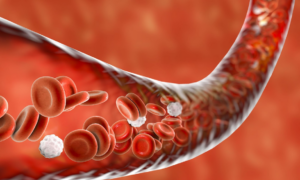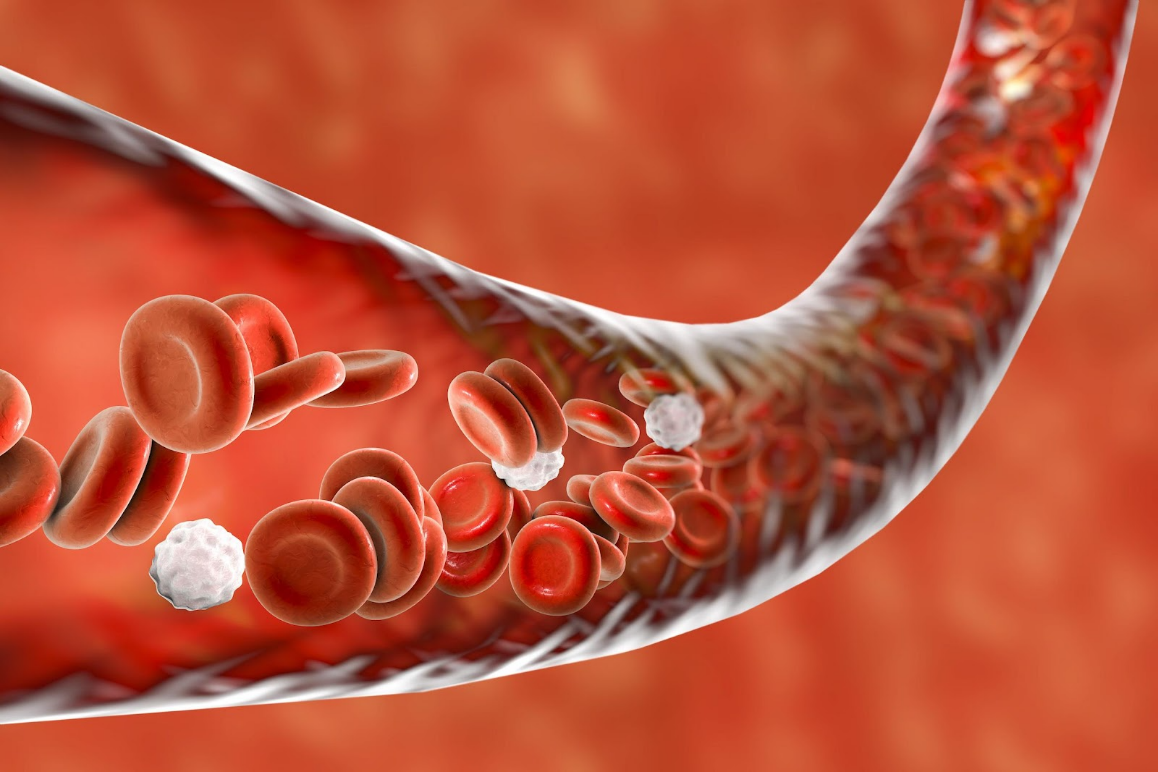3 Dietary Habits to Treat Anemia and Nourish the Blood

Anemia is a condition characterized by a deficiency of healthy red blood cells, leading to inadequate oxygen supply to the body’s organs. This often manifests as symptoms such as feeling cold, experiencing shortness of breath, and feeling tired or weak.
In the United States, anemia is the most prevalent blood condition, affecting nearly 6 percent of the population. Certain groups, such as women, young children, and individuals with chronic illnesses, are more susceptible to developing anemia.
Traditional Chinese medicine (TCM) posits that poor health stemming from conditions such as anemia may be related to what practitioners term “dirty blood.” Therefore, treating anemia requires blood nourishment and clearing blood stasis. So how can we enrich our blood so the body can be adequately nourished with nutrients? There is much to unpack here, but it starts with knowing how to eat.
Before we can treat anemia, we must determine its underlying cause. However, even before that, we must understand where blood is made.
TCM: Blood Is Made in the Intestines
Modern Western medicine believes that red blood cells (RBC) and various types of white blood cells (WBC) in the bloodstream come from bone marrow and that platelets are also formed in marrow by the rupturing of megakaryocytes.
However, the Lingshu (Spiritual Pivot): Qi Determination chapter in the Chinese traditional medicine classic “The Yellow Emperor’s Canon on Internal Medicine” says: “The spleen, stomach, liver, and gallbladder receive nutrients from food and convert it into a red substance called blood.”
TCM practitioners believe that the human hematopoietic (blood-making) center resides within the intestines, not the bone marrow, as Western medicine suggests. The distribution of blood throughout the various parts of the body under normal circumstances is as follows:
- Digestive system: 20 to 25 percent
- Kidneys: 20 percent
- Brain: 15 percent
- Muscles: 15 to 20 percent
- Skin: 4 to 5 percent
- Bones: 3 to 5 percent
These proportions suggest that the digestive system contains most of our blood volume. Therefore, to explore the causes of anemia, it is best first to examine the intestinal tract.
Intestinal Hematopoiesis Theory
After years of experiments, research, and clinical trials, Dr. Keiichi Morishita, a famous Japanese physician, discovered that the intestines are the source of human hematopoiesis.
Morishita’s Intestinal Hematopoiesis Theory postulates that food is first broken down by various enzymes into smaller molecules and turned into chyme, a semi-fluid mass of partially digested food. Gastrointestinal peristalsis then pushes the chyme into the small intestine. This non-nucleated chyme is surrounded by numerous villous epithelial cells in the small intestine, where it is completely digested and broken down. Completely digested chyme will become part of the villous epithelial cells’ cytoplasm and new villous epithelial cells.
As the number of villous epithelial cells transformed by the non-nucleated chyme grows, the old cells will gradually be pushed to the bottom. This process causes a qualitative change, transforming villous epithelial cells into erythroblasts. Erythroblasts are relatively large cells that lead to the formation of red blood cells (RBCs) in the cytoplasm.
A study published in Cell Stem Cell in 2019 pointed out that the human intestine contains hematopoietic stem cells and various progenitor cells.
Researchers found that donor blood cells circulate in the recipient’s blood during bowel transplants.
Moreover, the blood cells obtained from the transplanted intestines were always present and in massive quantities, suggesting that the transplanted intestines may contain hematopoietic tissue that can produce blood cells by itself.
Researchers followed 21 intestinal transplant patients over five years and found that donated intestines can produce blood stem and progenitor cells. These cells were found stuck to the mucosa of the donor’s intestine.
TCM: Take Good Care of Your Body to Make Quality Blood
Mounting evidence shows that the key to health lies in the state of the body’s cells and blood. And the key to whether the blood is “clean,” or high quality, lies in the health of the intestinal tract.
Excessive meat consumption can impact proper stool excretion, producing toxins in the intestines and making the blood more acidic. As blood is ubiquitous, these toxins in the intestinal tract will circulate throughout the body, making the whole body acidic. Elevated acidity can cause acute and chronic inflammation. Many allergies and acute and chronic diseases are somehow related to this. From the perspective of natural medicine, cancer is mainly caused by complications that start with intestinal dysfunction and its impact on blood quality.
Treating conditions such as anemia requires a multifaceted approach. Managing emotions and lifestyle and choosing the proper diet are crucial to activating the body’s metabolism. Having a foundation of good habits will lead to nourished blood. The body can heal itself when it is empowered to expel toxins successfully.
Choose a Balanced Diet of Vegetables, Fruits, and Meat
The chapter Suwen: Method of Qi Storage in “The Yellow Emperor’s Canon of Internal Medicine” states: “The five grains are key for basic nourishment, the five fruits as support, the five livestock for energy supply, and the five vegetables are as other supplements. Taking all these together is vital for complete nourishment of essence and qi (vital energy).”
A balanced diet is essential to take good care of your body and nourish your qi. Among these lists of five, the grains refer to all cereals and legumes, including japonica rice, small beans, wheat, soybeans, and yellow millet. They are dietary staples for the human body. The other foods take on a more supportive role.
For example, the five fruits can add further nourishment, the types of meat can enhance essence and blood, and the vegetables can enrich the viscera with good qi. Therefore, you should primarily eat whole grains and other unrefined grains and fresh and seasonal vegetables, fruits, meat, and seafood as supplementary food to achieve balanced nutrition. In terms of amount, you should eat until you’re 70 to 80 percent full to maintain a slight degree of hunger.
Eat Mindfully and Avoid Overeating
Overeating can cause indigestion, hurt the stomach and intestines, overtax the body, and consume excess energy. The body fails to absorb nutrients whenever gastrointestinal function is jeopardized, so overeating is not a good idea.
In addition, always eat mindfully and without distractions. Avoid talking, reading, looking at your phone, watching TV, and the like while eating, and thoroughly chew your food to allow saliva and food to mix thoroughly before swallowing.
Thoroughly Chewing Is Good for Your Health
Thoroughly chewing your food sounds simple, but it is crucial to maintaining health. In the past, maintaining body fluids was the most critical thing advocated in Taoist health doctrines. Taoists believed that filling your mouth with saliva and swishing it before swallowing would have the best health benefits.
Dr. Hiromi Shintani, an eminent Japanese gastroenterologist, believed that eating a lot of food containing live enzymes, followed by chewing thoroughly and eating only until one is 80 percent full, are all practices for good health.
Only 30 percent of food that is not chewed sufficiently can be absorbed by the body. Poor absorption coupled with indigestion caused by things such as overeating will cause abnormal fermentation in the intestines, producing various toxins. To detoxify, the body must consume more enzymes. Thoroughly chewing your food will increase saliva secretion and require fewer digestive enzymes. This means more enzymes will be available to detoxify and repair the body, supply energy, and maintain homeostasis. As a result, resilience and immunity are improved, and life expectancy is also increased.
A Prescription for Nourishing Qi and Blood for Anemics
Maintaining gastrointestinal health is vital in treating anemia. Many anemia patients are prone to abdominal distension and indigestion symptoms. To relieve abdominal distention, they can take the following:
- Hawthorn (pregnant women should avoid it)
- Koji
- Malt
- Dried tangerine peel
- Bergamot
- Cyperus cyperi
- Citrus aurantium (bitter orange)
- Magnolia officinalis
People with poor stool quality and habitual constipation should eat more fruits and vegetables, less meat, and exercise to help promote bowel movements and detoxify the intestines.
TCM believes that nourishing qi can generate blood. In that respect, taking qi-enhancing medicines (such as ginseng and Astragalus) to enhance the vitality of body cells, tissues, and organs and encourage hematopoiesis is better. In addition, red foods such as apples, carrots, red dates, medlar fruit, beef, and the like enrich the blood and are recommended for anemia.
Simple Recipe for Qi and Blood Nourishment
Take an appropriate amount of ginseng (Korean, Shizhu, or Codonopsis are good), Dimocarpus longan, and goji berry and boil or brew them in hot water. If your mouth becomes dry after ingesting the tea, add some yin-nourishing medicines such as Ophiopogon japonicus or Fragrant Solomon’s Seal rhizome (Polygonatum odoratum) to balance the hot properties of the three herbs.
*Some herbs mentioned in this article may be unfamiliar, but they are generally available in Asian supermarkets.
Note: Because different people have different constitutions, consulting your doctor or TCM experts is recommended.




